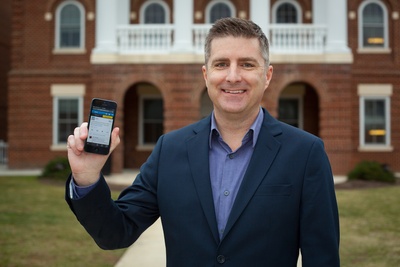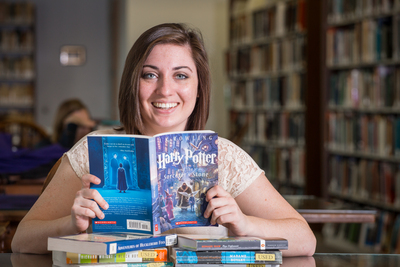It was innocuous enough: a simple tweet during a lull in class. It’s the type of thing that happens hundreds of times a day.
But most student tweets don’t end up in front of the department chair, or spark an idea that gains momentum and culminates in a new course taught jointly by ten professors.
Longwood student Emily Hines, at least, didn’t think anything would come from her tweet—she was just struck that she’d like a course on banned books after studying the frequently banned Huckleberry Finn.
"I like the concept of banned literature," said Hines. "What is it that makes this taboo? What is it people don’t want to hear? It’s weird but interesting. They’re just words. How can you ban that? And besides, it’s just fiction. Huck Finn isn’t real."

Hines’ tweet, "I want nothing more than to take a class on banned books. Help a girl out." reached the twitter account of Longwood’s department of English and Modern Languages, and onto the desk of the department chair, Dr. Wade Edwards. "It’s highly unusual for a course to evolve from a single suggestion from a student," said Edwards. "This is the result of student initiative, social media, a campus awareness of banned books and a willingness to try to something new."
The result is a high-level elective course titled Contested Books: 1779-Present. It is taught by ten faculty members, including four modern language professors. "This is a semester-long conversation about censorship in different forms and from different time periods and different continents," said Edwards, a French professor. "The course is working well so far, which I attribute to the combination of a great topic and the experimental approach of a professor of the week."
The course, which meets Wednesday evenings for nearly three hours, follows a chronological path—it began with the 1779 German play Nathan the Wise and will conclude with Harry Potter and the Sorcerer’s Stone. Other books include Huckleberry Finn, the 19th century French novel Madame Bovary and Richard Wright’s memoir Black Boy. The curriculum is about not only banned books but books that have have been "censored, challenged or otherwise kept out of readers’ hands," said Dr. Sean Barry, an English professor who is teaching the course.
The course, coordinated by Dr. John Miller, an English professor, also includes music and film. One class period, two of the instructors and three other EML faculty members who Barry said wanted to "join the fun" led students in singing six of Robert Burns’ Merry Muses of Caledonia, bawdy songs that were among those the late 18th century Scots poet liked to collect.
"We were singing them communally, which is the way they were supposed to be sung," said Barry, a specialist in the Romantic period, among three faculty members playing guitar that evening. "One of the students later came to my office and said she involuntarily found herself singing some the songs. That’s good, because it’s impossible to learn poetry if you don’t recite it."
n mid-March, as part of her presentation on art that Nazi Germany considered "degenerate," Dr. Carrie Collenberg-Gonzalez, a German professor who is a specialist in German film, will show the 1920 film The Cabinet of Dr. Caligari. She also will explore Dada poetry and expressionist art.
"A lot of students’ perception of art was formed by avant-garde movements in Europe at the turn of the 20th century, so it’s important that students understand their historical and cultural context," said Gonzalez, who played guitar for the Merry Muses of Caledonia songs in late January.
Discussion of banned books is nothing new to Longwood’s campus—students in several literature courses study books that are frequently challenged and the department of English and Modern Languages partners with the university’s Greenwood Library to host an annual Banned Books Week. But for Hines, it was all coincidence.
"It’s the first and only time I’ve tweeted English and Modern Languages," said Hines, a junior from Vienna who plans to teach high school English. "I thought it was funny the department had a Twitter account, which I had stumbled on a few days earlier. This was an interesting string of coincidences and accidents. None of this was planned, but I’m glad that I sparked the idea."




Leave a Comment